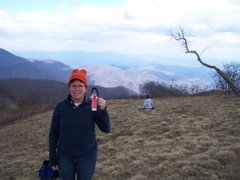Roland Tester
U.S. Government Teacher
Daniel Boone High School
Gray, Tennessee

Summer and Thursday afternoon were fading when I arrived in Hot Springs, via Mars Hill and sundry hamlets on the road through Western North Carolina; one of my favorite regions to ramble around. I am reasonably familiar with Hot Springs, but I had never been to (or even heard of) my destination, The Sunnybank Inn. I found the address, and pulled into a driveway occupied by a number of cars bearing progressive/liberal/pro-environmental bumperstickers.

Figuring I had found the right place, I walked up to the house. Shelves and cabinets and bookcases filled with pottery, books, and trail needs/gifts/trades crowded the porch. I knocked on the door and stepped into a very clean and incredibly equipped and supplied kitchen: bundles of herbs, peppers, and spices dangling hither and fro; burnished pots and pans and gleaming utensils hanging by the dozens; notes, books, photos, prints, and paintings peeking out from every nook and cupboard. A dry erase board was on the fridge, and my name was on it (spelled correctly even!)
No one appeared to be around. “Hello?” I called.
I waited a couple of minutes and went a bit further in, “HELLO?”
I then got a response: “Ruh-Roof!”

A curious Border Collie/Dalmatian/HeinzHound57 came ambling out. We quickly became friends due to our good natures and the bag of Canine Carry-Outs I habitually carry in a pocket. We wandered around the house (if I may use such a pedestrian description for the Sunnybank Retreat) for a bit, and I marveled at the décor; the furniture, the lamps and ancient fixtures, the curios, relics, statues, and the shelves and shelves of books. My new friend and I hung out for a little while. Eventually some humans showed up. I was delighted to see familiar faces from the Southern Cohort and the ATC staff. I was introduced to our host, Mr. Elmer Hall, and found out my four-legged friend was known as Jimmy Carter. Elmer gave us all (as more and more of the TTEC crew drifted in over the next few hours) a semi-formal walkabout of the Inn, and showed me my room (wonderful accommodations).

Elmer had mentioned that meals at the Sunnybank Inn were exclusively vegetarian; he explained that the Inn hosted so many Hindu groups and families, (?) that he had gone vegetarian with all the meals just to simplify things. Being a carnivore, I raised an eyebrow at this, but as the first breakfast was served, my slight misgivings were dispelled; everything Elmer and his crew made was incredible. Following breakfast, Elmer gave us a detailed history of the town of Hot Springs and the Sunnybank Inn, including a number of anecdotes of the many memorable characters that have stayed there over the past several decades.

Our cohort went on a Discovery Quest up and around to the west. We visited one of the hostels, tracked and counted the AT markers down the sidewalk (The AT runs through the middle of the town), visited a number of cultural/historical sites, generally checked out the town, and had a fine lunch at the Smokey Mountain Diner (highly recommended),
We then embarked on our main activity of the day, the Lover’s Leap Hike. We noted native flora and fauna, looked for invasive species, and discussed seasonal differences in the plant life along various sections of the AT (I confess, before these workshops, I had never heard the term “Phenology”, much less knew that it was a defined and dedicated field of study). The hike was wonderful and the views were spectacular.

After the hike, we did a session in the mineral waters of the Hot Springs Resort, and although it was pleasant, I reflected that it was nothing out of the ordinary; the gym I go to actually has a much larger and nicer Jacuzzi. “Taking the Waters”, one of the primary reasons for the existence of Hot Springs as a town, has in my opinion, become rather mundane. We finished the day with an outstanding supper from Elmer and his crew.
After another amazing breakfast (I don’t know how Elmer managed to make vegetarian gravy taste so incredibly good), the cohort traipsed down to the Hot Springs Public Library (many people don’t realize what a boon even a modest library is to a small, rather isolated town) where we could catch a Wi-Fi signal, and organize and put the final touches on our TTEC lesson and unit presentations. Finishing these at the last second in true “grad student” style, we hurried back to the Sunnybank and gave our presentations We discussed, critiqued, suggested, and networked (with a break for an excellent lunch) way up into Saturday afternoon.
At the last, our mentors and guides from the ATC/TTEC had prepared a special ceremony for the members of the Southern Regional Cohort completing the TTEC program. We walked into the side yard, where we were given accolades and a rather nice certificate of completion from the ATC and the National Parks Service. We were charged with keeping the spirit of wild places and wilderness beating within our hearts, and instilling a sense of community and stewardship within the hearts of our students. I take this very seriously, and I feel honored to be entrusted with this.
As with all of our workshops, the only thing I disliked was the fact that it had to come to an end, and I had to say farewell to wonderful places, and more importantly, people that I had become very attached to. My experience with the TTEC and my involvement with the ATC make me feel like a part of an extended family, and part of something much greater than myself; something that began long before I arrived on the scene, and something that will continue long after I have moved on. I’m a better person for the experience. Thank you all for everything this year


































